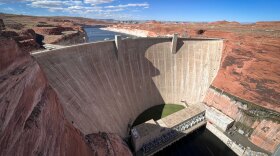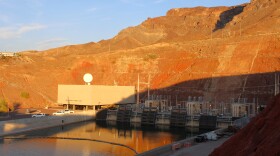-
Water leaders in the U.S. West gathered this week in Las Vegas with a hefty task hanging over their heads — figuring out a long-term plan for sharing water from the Colorado River.
-
Utah and the 6 states that share the river missed a federal Nov. 11 deadline to make progress on a new water agreement. Gov. Katie Hobbs said she has a hard time believing the Upper Basin states can't reduce water use.
-
"I was a political casualty," said Ted Cooke, a longtime Arizona water manager. Some policymakers in the Upper Basin quietly expressed concern that he might favor the Lower Basin in negotiations.
-
Several environmental groups want the federal government to curb water waste in the Lower Basin states of California, Arizona and Nevada.
-
Colorado River states appear to be coalescing around the early makings of a new plan to share water in a way that accounts for climate change.
-
Cooke is the former manager of the Central Arizona Project. Regional water experts regard him as a qualified expert.
-
Water experts opened June by gathering at the University of Colorado, Boulder, for talks about the future of the Colorado River. Top policymakers were notably absent.
-
Funding from the Inflation Reduction Act was allocated to conserve water and protect habitat, but President Donald Trump's executive order put that spending on hold.
-
Water managers across the West say they do not expect a new Trump administration will alter post-2026 Colorado River talks.
-
Engineering hurdles, high costs and political challenges stand in the way of an easy fix to the West's water shortages.
-
The river outlet pipes inside Glen Canyon Dam are getting a $9 million repair job, but conservation groups want to see more permanent changes at Lake Powell.
-
In Glen Canyon, home to Lake Powell, the shrinking reservoir has revealed areas that were once submerged. These scientists are counting the plants that live there, and have found that they're mostly native.
Play Live Radio
Next Up:
0:00
0:00
Available On Air Stations










